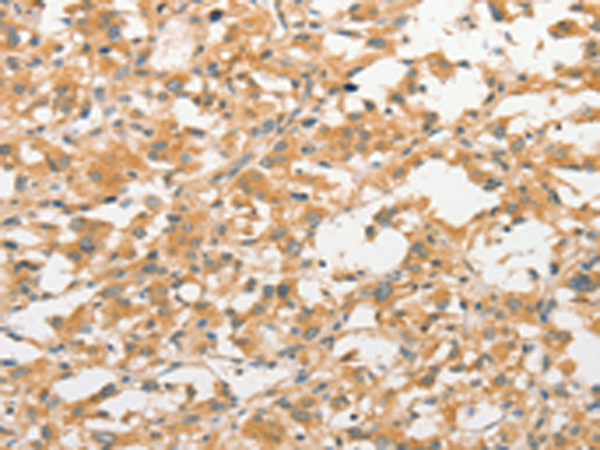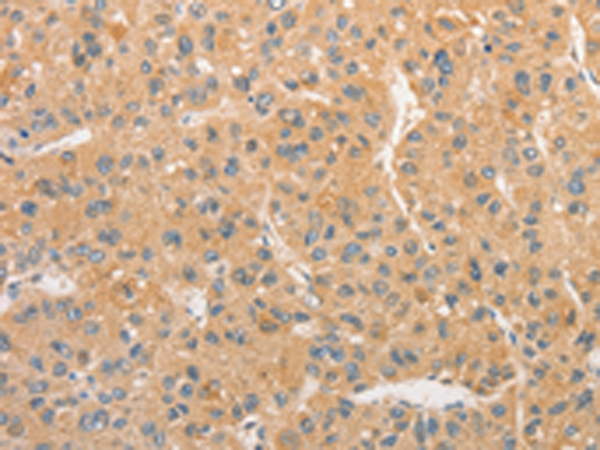

| WB | 咨询技术 | Human,Mouse,Rat |
| IF | 咨询技术 | Human,Mouse,Rat |
| IHC | 1/50-1/200 | Human,Mouse,Rat |
| ICC | 技术咨询 | Human,Mouse,Rat |
| FCM | 咨询技术 | Human,Mouse,Rat |
| Elisa | 1/1000-1/5000 | Human,Mouse,Rat |
| Aliases | CD283; IIAE2 |
| Host/Isotype | Rabbit IgG |
| Antibody Type | Primary antibody |
| Storage | Store at 4°C short term. Aliquot and store at -20°C long term. Avoid freeze/thaw cycles. |
| Species Reactivity | Human |
| Immunogen | Fusion protein of human TLR3 |
| Formulation | Purified antibody in PBS with 0.05% sodium azide and 50% glycerol. |
+ +
以下是3篇关于TLR3抗体的参考文献及其摘要概括:
1. **文献名称**:*TLR3 immunity to infection in mice and humans*
**作者**:Zhang, S.Y., et al.
**摘要**:该研究探讨了TLR3在抗病毒感染中的关键作用,通过使用TLR3特异性抗体阻断信号通路,发现TLR3缺陷小鼠对疱疹病毒易感性增加,提示TLR3抗体在调节抗病毒免疫中的潜在应用。
2. **文献名称**:*Targeting TLR3 with a novel antibody enhances antitumor immunity in melanoma*
**作者**:Salaun, B., et al.
**摘要**:研究开发了一种新型TLR3激动剂抗体,证明其能激活树突状细胞并增强T细胞对黑色素瘤的杀伤作用,为癌症免疫治疗提供了新策略。
3. **文献名称**:*TLR3 antibody inhibits lupus nephritis by suppressing type I interferon production*
**作者**:Patole, P.S., et al.
**摘要**:通过在小鼠狼疮模型中应用抗TLR3抗体,研究发现其能减少I型干扰素的产生,缓解肾脏炎症,提示TLR3抗体在治疗自身免疫性疾病中的潜力。
---
若需更多文献或具体细节,可进一步提供研究方向或数据库检索关键词。
Toll-like receptor 3 (TLR3) is a transmembrane protein belonging to the Toll-like receptor family, which plays a critical role in innate immunity by detecting pathogen-associated molecular patterns (PAMPs). TLR3 specifically recognizes double-stranded RNA (dsRNA), a molecular signature of viral infections, and activates downstream signaling pathways to induce pro-inflammatory cytokines and type I interferons. Structurally, TLR3 localizes to endosomal membranes and utilizes the adaptor protein TRIF (TIR-domain-containing adapter-inducing interferon-β) to trigger NF-κB and IRF3-mediated antiviral responses.
TLR3 antibodies are essential tools in research for detecting TLR3 expression, mapping its localization, and studying its functional interactions. They are widely used in techniques like Western blotting, immunohistochemistry, and flow cytometry to investigate TLR3's role in viral infections (e.g., COVID-19. hepatitis), autoimmune disorders (e.g., lupus), and cancers. Some studies highlight TLR3's dual role: while its activation can suppress viral replication, dysregulation may contribute to chronic inflammation or immune evasion in tumors. Therapeutic antibodies targeting TLR3 are being explored to modulate excessive inflammation or enhance antiviral immunity. However, challenges remain in understanding tissue-specific TLR3 signaling and optimizing antibody specificity for clinical applications.
×